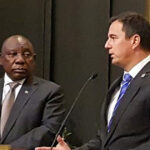Johannesburg – Tensions between South Africa and the United States have escalated dramatically following the chanting of the contentious "Kill the Boer, Kill the Farmer" song by the Economic Freedom Fighters (EFF) at the Sharpeville Massacre commemoration on Friday. The incident has drawn sharp criticism from US officials, further straining already fragile relations.
US Secretary of State Marco Rubio took to social media on Monday to condemn the chanting of the song, which critics argue incites violence against white farmers. Rubio stated that Afrikaners facing threats of violence would be welcomed into the United States.
Rubio posted on X, stating: “South Africa’s leaders and politicians must take action to protect Afrikaner and other disfavoured minorities. The United States is proud to offer those individuals who qualify for admission to our nation amid this continued horrible threat of violence.”
Rubio's statement comes as the US has revoked the legal status of over 530,000 Cubans, Haitians, Nicaraguans, and Venezuelans, who they claim face persecution in their home countries. The US also intends to close its borders to over a dozen mostly African and Arab countries.
The controversy surrounding the "Kill the Boer" chant has been a long-standing point of contention. Critics argue that the song has been used as a call to action for anti-white violence, specifically targeting white farmers.
US President Donald Trump has also weighed in on the matter, sharing a screenshot of Elon Musk's tweet on his Truth Social media platform. Musk's tweet stated: "Very few people know that there is a major political party in South Africa that is actively promoting white genocide. The video [of Malema chanting 'Kill the Boer'] was just [recent]. A whole arena chanting about killing white people."
AfriForum CEO Kallie Kriel, whose organisation has been instrumental in highlighting the issue to US officials, thanked Trump for his attention to the matter.
Kriel tweeted: "Thank you, President @realDonaldTrump for taking note of the irresponsible calls for violence against Afrikaners/whites—through hate chants such as “Kill the Boer, kill the farmer”—in South Africa. The tragic irony is that the latest incident occurred on March 21, which is officially known as “Human Rights Day” in South Africa. What makes this even worse is that this renewed call for violence against Afrikaners was not condemned by @PresidencyZA Ramaphosa, ANC leaders, or the South African @GovernmentZA. Their silence regarding this gross human rights violation is deafening."
The current tensions are rooted in a history of disagreements between the two nations. Trump previously suspended financial aid to South Africa and extended refugee status to Afrikaners, citing concerns over land expropriation and discrimination.
These actions followed President Cyril Ramaphosa’s signing of the Expropriation Act, which allows the government to take land and other property for public purposes.
The South African government has consistently defended itself against what it calls a "false narrative" surrounding the Expropriation Act.
President Ramaphosa recently addressed the issue, urging people to reject the politics of divisiveness.
“In particular, we should challenge the completely false narrative that our country is a place in which people of a certain race or culture are being targeted for persecution,” he stated.
Adding to the diplomatic strain, former South African ambassador to the US, Ebrahim Rasool, recently returned to Cape Town after being declared persona non grata by the US government. This action followed remarks Rasool made during a webinar, in which he associated President Donald Trump with white supremacy. Rasool has maintained that his remarks were not directed at Trump.











